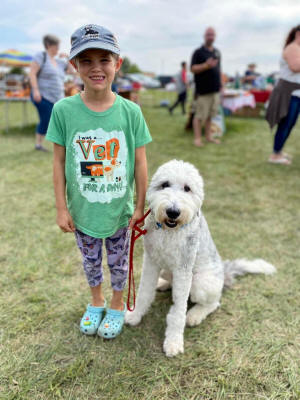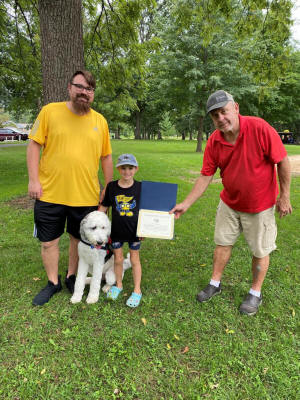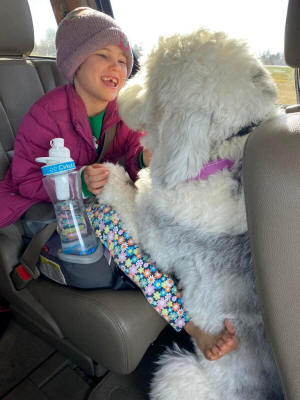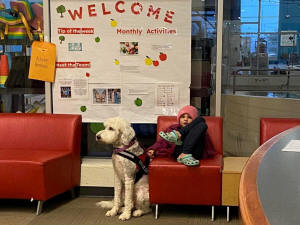|
 How
it all began How
it all began
Seven-year-old Willow often struggles with feeling calm due to a
sensory processing disorder.
Willow lives with her mom Jodie, dad John and older sister Aera. Her
mother Jodie said Willow enjoys activities like climbing anything
she can, playing soccer and tumbling. Willow also enjoys going to
school, spending time with grandparents and playing games with
family.
However, activities that involve being in crowded places can cause
Willow great stress. Since Willow was an infant, one coping
mechanism has been pulling out her hair. In recent years, she was
diagnosed with Trichotillomania, which is listed in the Diagnostic
and Statistical Manual of Mental Disorders Fifth Edition as a “hair
pulling disorder currently classified under Obsessive-Compulsive and
Related Disorders.”
Therapies have helped Willow in various areas, but unfortunately,
none had reduced her hair pulling.
Then one day a couple years ago, the family was at a flea market,
one of Willow’s least favorite places. Willow saw a woman and her
dog standing near them and calmly asked if she could pet the dog.
The lady quickly said yes.

Before the Merritt’s knew it, Willow was lying in the
Standard Poodle’s thick fur. Her parents said it was the most
relaxed they had seen Willow act in a crowd. Willow stayed that way
for about ten minutes and the owner encouraged her to relax as the
rest of the family enjoyed the flea market stands nearby.
Finally, the Merritts told Willow it was time to let the owner enjoy
the flea market, but Jodie said Willow had a completely different
demeanor after the experience.
Later in the day, the family saw the dog again and the owner told
Willow she could pet the dog some more. Jodie started talking to the
owner, and found out that the dog, named Truly, was a retired
service dog.
The woman told Jodie she could tell by Truly and Willow’s connection
there was something special about Willow. Upon hearing Willow’s
story, Truly’s owner said she believed a service dog could be a huge
help to Willow. As the family walked away, Jodie said she and John
both thought: “this encounter was not a coincidence.”
They began researching how to get a service dog for Willow,
initially working with a local non-profit that trains service dogs
and gives them to families at no charge. The family hoped it would
work, but the agency changed their minds towards the end of the
application process.
Though disheartened, the Merritt family soon found a psychiatric
service dog organization and met Aspen, a 13-week-old Sheepdog
Poodle mix bred with the intention of becoming a psychiatric service
dog. As they shared the story with the organization, Jodie said they
became even more confident getting a service dog would be the best
move.
First, though, they needed to raise funds to attain a service dog
through this organization. The total costs for the dog, training,
long term support and other items would be $17,000.
The family started a GoFundMe Campaign with the goal of raising
$15,000. Within days of posting the campaign on their Facebook and
sharing Willow’s story on WAND news, the family had raised the
money.

Aspen joined the family on November 26, 2022, and
quickly became part of the family.
An update on Willow and Aspen
After spending several months with the family and getting acclimated
to their routines, Aspen had to complete specialized training.
Over the summer, Aspen went through ten weeks of specialized
training to work on socially acceptable behaviors and obedience
training. Jodie says socially acceptable behavior is important for a
service dog because it needs to be able to be in social situations
and act appropriately. It shouldn't sniff people walking by or lick
food off the floor. It shouldn't bark if startled. She was also
trained on specific commands. At the end of her 10 weeks away, the
Merritts joined her for certified handlers training.

Before being officially certified, Willow, her
parents, and Aspen had to complete the Public Access Test after
training with Aspen for 3 days. This training included eating at a
restaurant where Aspen had to lie under the table and not react to
people walking by or sniff/eat food off the floor, walking through a
store keeling and following commands given.
[to top of second column]
 |

Aspen also had to walk past "Diesel Row" in the back
of the parking lot where semis park and leave them running. It's
noisy, and the purpose of this test is for Aspen to show that she
can obey her handler even in a stressful and distracting
environment.
Finally, Aspen had to complete recalls and other outdoor testing to
further show that she could manage being in different environments
while remaining obedient to her handler. Typically, when a child is
having a service dog trained, the parent takes the Public Access
Test as he or she will be the primary handler of the dog.

The trainers were so impressed with Willow's ability
that Jodie said they had her complete most of the Public Access
Test, anything she didn't do on her own, she did alongside her dad.
Willow is the youngest to have ever completed the test with this
training organization. Handling Aspen gave Willow a place to put all
of her energy and angst making situations that used to be difficult
for her so much easier.

There are many ways Aspen has been helpful for
Willow. Jodie said Aspen is most helpful publicly when the family is
traveling and goes to different appointments. Her primary purpose is
actually at home. Aspen provides sensory input to help settle
Willow's nervous system in a variety of ways but especially when she
is falling asleep at night.

Having Aspen has brought big changes to Willow. For
example, Jodie said Willow has so much more confidence when she is
handling Aspen. It gives a place for her nervous energy to focus.
She walks differently -- it's really beautiful to witness.
One way Aspen has helped Willow is by helping her
feel more comfortable and confident. Willow has started back at
Occupational Therapy, and Jodie said they have been encouraged by
how much more comfortable she is at these appointments.

When Willow previously went to occupational therapy
appointments, Jodie said “every 40 minute drive was miserable, and
Willow was tense for every appointment.”
Because of how tense Willow was, Jodie “felt they could never help
her fully because she wasn’t even close to herself…which made it
difficult for therapists to really understand her and help us add
tools to our toolbox.”
Now, Jodie said Willow is completely herself because she has Aspen
by her side. She is able to learn alongside us as we learn more
about Sensory Processing Disorder and how we can help her body get
what it needs in moments of difficulty.
As Jodie said, “Aspen isn’t going to stop Willow’s Trichotillomania,
and that’s not really why we have her.” What Aspen does is to
empower Willow to be herself so she can get more out of her
appointments.
Willow and Aspen have a special bond and make quite a pair.
|